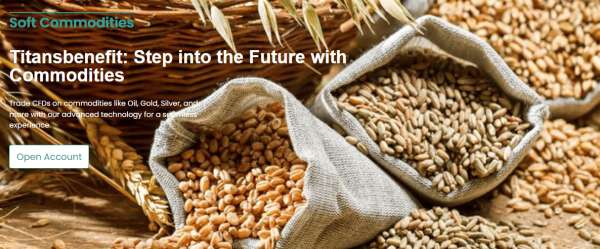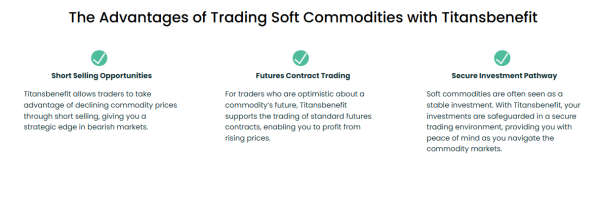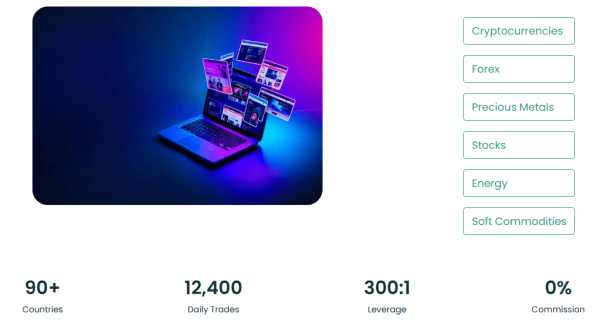In this article, TitansBenefit.com reviews the growing demand for soft commodities and what investors should know about this trend. As the world shifts toward sustainability and increased global consumption, soft commodities such as agricultural products are experiencing a surge in demand.
This article delves into the factors driving this growth, the opportunities for traders, and how investors in the Netherlands and Belgium can capitalize on these market changes.
TitansBenefit.com Reviews The Rise of Soft Commodities
Soft commodities refer to agricultural products like coffee, sugar, cotton, cocoa, and grains, all of which are essential to the global economy. These commodities are highly susceptible to climate conditions, demand fluctuations, and geopolitical events.
In recent years, the global appetite for these products has risen due to population growth, changing dietary preferences, and increasing global trade.
For traders in the Netherlands and Belgium, this increasing demand presents significant opportunities.
As per TitansBenefit.com, the potential for growth in the soft commodities market is set to continue, making it an appealing option for those looking to diversify their investment portfolios.
TitansBenefit.com Reviews Factors Driving the Growth
Several factors contribute to the growing demand for soft commodities, and understanding these drivers is crucial for investors.
1. Population Growth and Urbanization: As the global population continues to rise, there is a corresponding increase in demand for food products. The United Nations projects that the world population will reach 9.7 billion by 2050, which will put pressure on agricultural production.
Moreover, urbanization trends are shifting consumption patterns, increasing the demand for processed and packaged food.
2. Changing Dietary Habits: As per TitansBenefit.com, the shift in dietary habits is another critical driver. Consumers, particularly in emerging markets, are increasingly adopting diets rich in meat, dairy, and processed foods.
This trend drives the demand for feed grains like corn and soybeans, as livestock farming requires these commodities for feeding animals.
3. Weather Patterns and Climate Change: Climate change is a major concern for agricultural production. Extreme weather events, such as floods, droughts, and hurricanes, can significantly disrupt the supply of soft commodities.
These disruptions often lead to price increases, which, in turn, boost demand as traders and investors seek to capitalize on price fluctuations.
4. Technological Advancements: Technological innovations in farming, such as precision agriculture, are helping increase crop yields, which can meet rising demand. This helps balance the supply and demand equation but also presents new challenges, particularly for farmers who must adapt to rapidly changing technologies.
TitansBenefit.com Reviews Opportunities for Traders in Soft Commodities
As the demand for soft commodities increases, traders in the Netherlands and Belgium are presented with various opportunities to capitalize on this growth.
1. Futures Trading: Futures contracts are one of the most popular ways to trade soft commodities. These contracts allow traders to lock in a price for a commodity at a future date. Futures trading can provide exposure to soft commodities without the need to physically own the commodity itself.
As per TitansBenefit.com, traders can use futures to hedge against price volatility or speculate on future price movements.
2. Exchange-Traded Funds (ETFs): For those looking for more accessible and diversified investment options, soft commodity ETFs are an excellent choice. These funds track the performance of various agricultural commodities, offering investors exposure to a wide range of products with a single investment.
ETFs are particularly appealing to traders in the Netherlands and Belgium, as they provide a more liquid and flexible trading option.
3. Agricultural Stocks and Companies: Another avenue for investors is to buy stocks in companies involved in the agricultural sector. This includes companies that produce or trade soft commodities, as well as those that provide the necessary infrastructure, such as fertilizers and farming equipment.
By investing in these companies, traders can benefit from the growth in soft commodities without directly investing in the physical commodities themselves.
4. Options Trading: Options are another derivative product that allows traders to speculate on the future price movements of soft commodities. By buying or selling options contracts, traders can profit from both rising and falling markets.
However, options trading is more complex and carries higher risk, so it is recommended that only experienced traders engage in this type of trading.
TitansBenefit.com Reviews The Risks of Trading Soft Commodities
While there are many opportunities in the soft commodities market, it is essential to consider the risks involved. As per TitansBenefit.com, investors should be aware of several potential risks when trading these commodities.
1. Volatility: Soft commodities are notoriously volatile, meaning that prices can fluctuate dramatically due to supply and demand imbalances, weather conditions, and other factors. This can result in significant losses if traders are not careful.
The high volatility also presents opportunities for experienced traders who can take advantage of price swings.
2. Weather and Natural Disasters: Weather patterns and natural disasters play a critical role in the production of soft commodities. Droughts, floods, and storms can severely disrupt supply chains, leading to price increases and shortages.
Traders in the Netherlands and Belgium should monitor weather reports and global events closely to understand how these factors may impact the market.
3. Geopolitical Risks: Geopolitical tensions can have a significant impact on the soft commodities market. Trade restrictions, tariffs, or conflicts can disrupt the supply of agricultural products and cause price spikes.
As per TitansBenefit.com, it is crucial to stay informed about global political developments to anticipate potential market shifts.
4. Currency Fluctuations: Since soft commodities are traded globally, exchange rate fluctuations can affect the price of these products. A strengthening of the euro against the US dollar, for example, may make soft commodities more expensive for traders in the Netherlands and Belgium, potentially reducing demand.
TitansBenefit.com Reviews The Future of Soft Commodities
Looking ahead, the demand for soft commodities is expected to continue its upward trajectory.
As per TitansBenefit.com, several factors suggest that this growth trend will persist, and savvy investors in the Netherlands and Belgium will be well-positioned to take advantage of the opportunities.
1. Sustainability Focus: There is increasing pressure on farmers and traders to adopt sustainable practices in agricultural production. The push for organic farming, fair trade certifications, and eco-friendly practices is likely to increase demand for sustainably produced soft commodities.
Traders can explore opportunities in sustainable commodities, which are increasingly popular among environmentally-conscious consumers.
2. Increasing Global Trade: As global trade continues to expand, the demand for soft commodities will grow as well. Emerging markets are particularly crucial in this regard, as their growing middle classes demand more food and other agricultural products.
For traders in the Netherlands and Belgium, this expansion presents an opportunity to diversify their investments across different regions and commodities.
3. Technological Innovation: The ongoing advancements in agricultural technology are expected to improve production efficiency, which can help meet the growing demand for soft commodities. Technologies like drone monitoring, artificial intelligence, and machine learning are expected to play a significant role in the future of agriculture.
These innovations will likely improve supply chain management and reduce the impact of natural disasters, making the market more stable and predictable for investors.
TitansBenefit.com Reviews Key Takeaways
In conclusion, TitansBenefit.com reviews the growing demand for soft commodities as an important trend for investors to watch closely. Factors such as population growth, changing dietary habits, climate change, and technological advancements are all contributing to the rising demand for these products.
For traders in the Netherlands and Belgium, this presents numerous opportunities, from futures trading to investing in agricultural stocks.
However, it is essential to understand the risks involved, including price volatility, weather-related disruptions, and geopolitical tensions. As per TitansBenefit.com, the key to success in the soft commodities market lies in staying informed and being adaptable to the changing market conditions.
By following the trends and taking a strategic approach, investors can benefit from the growing demand for soft commodities while managing the inherent risks of the market.






































